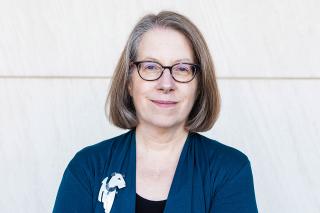Over the last four years, Valerie Leiter, Professor of Sociology and Public Health and Interim Dean, College of Social Sciences, Policy, and Practice, has worked as statistical consultant for the Massachusetts Commission on Lesbian, Gay, Bisexual, Transgender, Queer, and Questioning Youth. In this role, Leiter analyzes Massachusetts data on LGBTQ youth, examining youth risk behavior surveillance survey data. She also helps co-author the Commissions' annual report.
Originally founded in 1992 by Governor William Weld, the Commission on LGBTQ Youth was designed to respond to high suicide risk among gay and lesbian youth in the Commonwealth. In 2006, the Commission became an independent state agency, and now has 50 staff members. The purpose of the Commission is to advise agencies and officials in state government on effective policies, programs, and resources for LGBTQ youth. In recent years, the Commission has done important work concerning juvenile justice, homelessness, foster issues, and beyond.
At Simmons, Leiter teaches research methods at both the undergraduate and graduate levels and specializes in the sociology of childhood and youth and medical sociology. Leiter's teaching addresses LGBTQ issues, specifically the health inequities that LGBTQ individuals face.
With her background as a scholar and a statistical consultant, Leiter is acutely aware of the urgent need for policies that protect LGBTQ individuals from discrimination. "The effects of homophobia and transphobia on young people are really powerful," says Leiter. "They face bullying at school. They face cyberbullying on social media and on the internet. They face physical and sexual violence. They are more likely to be homeless because of families rejecting them and pushing them out of their home."
Leiter explains that problems at school or at home have devastating impacts on young people's mental health. For example, LGBTQ youth experience rates of suicidal ideation that are approximately three times greater than those of heterosexual cisgender youth. The COVID-19 pandemic has only made this situation worse. "People ended up being at home when they had to shelter in place with family members who are not accepting of their identities," says Leiter.
The Commission's most recent report underscores the fact that LGBTQ youth of color are especially vulnerable to the harmful effects of discrimination. The different aspects of a person's identity – including class, gender, race, and ethnicity – may overlap to create multiple forms of discrimination and disadvantage. "In this instance, the risk factors are much higher for youth of color. They are experiencing multiple forms of oppression."
Leiter's statistical analysis has also revealed some surprising findings regarding race and LGBTQ identity. "The data that I've looked at suggest that biracial and bisexual youth experience some of the highest prevalence of risk factors. In other words, people who don't fit into dichotomies may find it harder to negotiate their identities and be accepted."
One item that appears frequently in the Commission annual report is healthcare. Navigating healthcare can be especially problematic for people in the LGBTQ community. "There are biases that providers have about LGBTQ youth and they make heterosexist assumptions," explains Leiter. "Trans individuals often face discrimination when seeking healthcare. It can be very hard for LGTBQ individuals to actually find a provider who will provide them with equitable care." The Commission tries to address these issues by inspiring policy changes.
According to Leiter, the Commission also helps raise awareness and bring about positive change with the Safe Schools Program. Founded in 1993, Safe Schools is a joint program of the Commission and the Massachusetts Department of Elementary and Secondary Education (DESE). Safe Schools addresses the bullying and suicide risk that LGBTQ youth may experience in public schools by providing specialized training and technical assistance to students and staff. The training sessions aim to improve school climate by fostering a safe and inclusive space for LGBTQ youth. Incidentally, Leiter's son Ev Gilbert is the Commission's Youth Programs Coordinator.
"Safe Schools is a national model for inclusive curricula," says Leiter. "They have a youth leadership development program that provides advocacy tools and a sense of community." Safe Schools also hosts a youth summit every year. "Youth can be with each other and engage in community building and leadership development," says Leiter.
Working for the Commission has been rewarding for Leiter on a personal level. "This is something that is extremely important to me, especially as someone who identifies as queer and has queer family members. I believe that I can use my skills for the greater good. It is gratifying to be in community with others, even if it's through statistics!"

